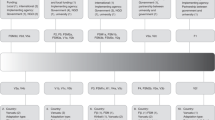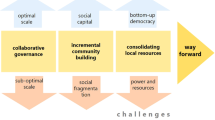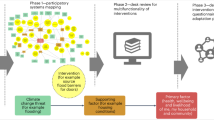Abstract
Encouraging adaptation to climate change is fundamentally about encouraging changes in human behaviour. To promote these changes, governments, non-profits and multilateral institutions have invested in a range of adaptation projects. Yet there is little empirical evidence about which project components are effective in changing human behaviour1,2. This lack of evidence is concerning, given that the failure of adaptation initiatives has been described as the global risk with the highest likelihood of occurring and with the largest negative impacts3. Here we report on a scholar–practitioner collaboration in which a simple one-day workshop delivering two ubiquitous components of adaptation projects4—capacity building and the dissemination of climate science—was randomly assigned among the management councils of over 200 community water systems in an arid region of Central America. The workshop was based on more than three years of scientific research and local collaborations, and it aimed to convey downscaled climate modelling and locally informed, expert-recommended adaptation practices. Two years later, we detect no differences in pricing and non-pricing management practices of participant versus non-participant councils. These results suggest weaknesses in the common practice of using simple workshops for delivering capacity building and climate science.
This is a preview of subscription content, access via your institution
Access options
Access Nature and 54 other Nature Portfolio journals
Get Nature+, our best-value online-access subscription
$29.99 / 30 days
cancel any time
Subscribe to this journal
Receive 12 print issues and online access
$209.00 per year
only $17.42 per issue
Buy this article
- Purchase on Springer Link
- Instant access to full article PDF
Prices may be subject to local taxes which are calculated during checkout


Similar content being viewed by others
Data availability
Survey data that support the findings of this study are available from the Open Science Framework at https://osf.io/vcu9d/.
Code availability
The Stata code that produced Fig. 2, Table 1, Table 2 and the Supplementary tables is available from the Open Science Framework at https://osf.io/vcu9d/.
References
Prowse, M. & Snilstveit, B. Impact evaluation and interventions to address climate change: a scoping study. J. Dev. Eff. 2, 228–262 (2010).
Silvestrini, S, Bellino, I. & Väth, S. Impact Evaluation Guidebook for Climate Change Adaptation Projects (Deutsche Gesellschaft fur Internationale Zusammenarbeit, 2015).
The Global Risks Report 2016 11th edn (World Economic Forum, 2016).
Biagini, B., Bierbaum, R., Stults, M., Dobardzic, S. & McNeeley, S. M. A typology of adaptation actions: a global look at climate adaptation actions financed through the Global Environment Facility. Glob. Environ. Change 25, 97–108 (2014).
Huang, J., Yu, H., Guan, X., Wang, G. & Guo, R. Accelerated dryland expansion under climate change. Nat. Clim. Change 6, 166–171 (2016).
Pfahl, S., O’Gorman, P. A. & Fischer, E. M. Understanding the regional pattern of projected future changes in extreme precipitation. Nat. Clim. Change 7, 423–427 (2017).
National Research Council Adapting to the Impacts of Climate Change (National Academies, 2010).
National Research Council Advancing the Science of Climate Change (National Academies, 2010).
Chambwera, M. et al. in Climate Change 2014: Impacts, Adaptation, and Vulnerability (eds Field, C. B. et al.) 945–977 (IPCC, Cambridge Univ. Press, 2014).
Moss, R. H. et al. Hell and high water: practice-relevant adaptation science. Science 342, 696–698 (2013).
How to Solve U.S. Social Problems When Most Rigorous Program Evaluations Find Disappointing Effects (Part One in a Series) (Arnold Ventures, 2018); https://go.nature.com/2Y5L0Xz
Updated Results-Based Management Framework for Adaptation to Climate Change under the Least Developed Countries Fund and the Special Climate Change Fund (Global Environment Facility, 2014).
Building Capacities for Increased Public Investment in Integrated Climate Change Adaptation and Disaster Risk Reduction: 2012–2015 (Baastel, 2017).
Famiglietti, J. S. The global groundwater crisis. Nat. Clim. Change 4, 945–948 (2014).
Schewe, J. et al. Multimodel assessment of water scarcity under climate change. Proc. Natl Acad. Sci. USA 111, 3245–3250 (2014).
Gosling, S. N. & Arnell, N. W. A global assessment of the impact of climate change on water scarcity. Climatic Change 134, 371–385 (2016).
Cinner, J. E. et al. Building adaptive capacity to climate change in tropical coastal communities. Nat. Clim. Change 8, 117–123 (2018).
Olmstead, S. M., Hanemann, W. M. & Stavins, R. N. Water demand under alternative price structures. J. Environ. Econ. Manag. 54, 181–198 (2007).
Molle, F. Water scarcity, prices and quotas: a review of evidence on irrigation volumetric pricing. Irrig. Drain. Syst. 23, 43–58 (2009).
Hallegatte, S. Strategies to adapt to an uncertain climate change. Glob. Environ. Change 19, 240–247 (2009).
Imbach, P. et al. in Climate Change Impacts on Tropical Forests in Central America: An Ecosystem Service Perspective (ed. Chiabai, A.) 65–90 (Routledge, 2015).
Madrigal, R., Alpízar, F. & Schlüter, A. Determinants of performance of community-based drinking water organizations. World Dev. 39, 1663–1675 (2011).
Madrigal-Ballestero, R., Alpízar, F. & Schlüter, A. Public perceptions of the performance of community-based drinking water organizations in Costa Rica. Water Resour. Rural Dev. 1, 43–56 (2013).
Madrigal-Ballestero, R. & Naranjo, M. A. Adaptive capacity, drought and the performance of community-based drinking water organizations in Costa Rica. J. Water Clim. Change 6, 831–847 (2015).
Imbach, P. et al. Modeling potential equilibrium states of vegetation and terrestrial water cycle of Mesoamerica under climate change scenarios. J. Hydrometeorol. 13, 665–680 (2012).
Lyra, A. et al. Projections of climate change impacts on Central America tropical rainforest. Climatic Change 141, 93–105 (2017).
Engle, N. L. Adaptive capacity and its assessment. Glob. Environ. Change 21, 647–656 (2011).
Brooks, N. & Adger, W. N. in Adaptation Policy Frameworks for Climate Change: Developing Strategies, Policies and Measures (eds Lim, B. & Spanger-Siegfried, E.) 165–181 (Cambridge Univ. Press, 2005).
Pidgeon, N. & Fischhoff, B. The role of social and decision sciences in communicating uncertain climate risks. Nat. Clim. Change 1, 35–41 (2011).
Fischer, C. Feedback on household electricity consumption: a tool for saving energy? Energy Effic. 1, 79–104 (2008).
Donatti, C. I., Harvey, C. A., Martinez-Rodriguez, M. R., Vignola, R. & Rodriguez, C. M. What information do policymakers need to develop climate adaptation plans for smallholder farmers? The case of Central America and Mexico. Climatic Change 141, 107–121 (2017).
Acknowledgements
This project was conducted with the help of a grant from the International Development Research Center, Canada. F.A. and P.J.F. thank programme officer W. Ubal for allowing the intervention to be randomized as part of the project ‘Agua para consumo humano, comunidades y cambio climático: Impactos esperados y adaptación en América Central’. We thank P. Petrou-Zeniou for research assistance and E. Leon Alvarado and her field team for their dedication and diligence.
Author information
Authors and Affiliations
Contributions
P.J.F. contributed to all aspects of the paper, including study design, statistical analysis, writing and revisions. F.A. and M.B.D.C contributed to the design of the study, writing and revisions. B.S.M. contributed to the statistical analysis, writing and revisions.
Corresponding author
Ethics declarations
Competing interests
The authors declare no competing interests.
Additional information
Publisher’s note: Springer Nature remains neutral with regard to jurisdictional claims in published maps and institutional affiliations.
Supplementary information
Supplementary Information
Supplementary Notes 1–4, Supplementary Fig. 1 and Supplementary Tables 1–9
Supplementary Material
Experimental materials
Rights and permissions
About this article
Cite this article
Alpízar, F., Bernedo Del Carpio, M., Ferraro, P.J. et al. The impacts of a capacity-building workshop in a randomized adaptation project. Nat. Clim. Chang. 9, 587–591 (2019). https://doi.org/10.1038/s41558-019-0536-3
Received:
Accepted:
Published:
Issue Date:
DOI: https://doi.org/10.1038/s41558-019-0536-3
This article is cited by
-
From capacity building to capacity sharing
Nature Sustainability (2023)
-
Social determinants of adaptive and transformative responses to climate change
Nature Climate Change (2020)
-
The limits of capacity building
Nature Climate Change (2019)



